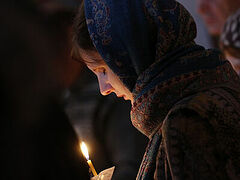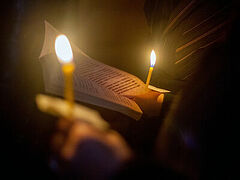 Maarten de Vos, Philips Galle. King Manasseh in prison
Maarten de Vos, Philips Galle. King Manasseh in prison
Here, St. Andrew introduces us to a period of Old Testament history wherein Israel is ruled by Judges. This is before the Monarchy was introduced, when there was yet hope that Israel would rely solely on God to be her King, thus avoiding the example of the surrounding idolatrous Nations. Firstly, we are called to emulate the piety of Manoah of old. Manoah, whose name means “peace” was the father of Sampson who was, along with Samuel, perhaps the most famous Judge of Israel. Sampson was born to Manoah and his righteous spouse. Manoah and his wife endured the reproach of barrenness and waited patiently on the Lord who gifted them with Sampson, a mighty defender of truth and righteousness in the Israel. How many—like Manoah and Sampson—in our own time take a firm stand against the idolatry of our era? The idolatry of our era is the worship of the individual and his rights. How many of us lay aside such individualistic tendencies? Sampson, originally, from idleness and lust broke his vows to the Lord, and became the subject of Delilah, his Philistine lover who shore his hair—the same hair consecrated to the Lord by which his strength was maintained. Surely, we have profaned signs of our consecration to Christ: Holy Baptism and Holy Chrismation, and by our unworthy participation in the Holy Mysteries. Let us seriously consider the spiritual state of our heart when we receive Holy Communion. Knowing that none is worthy, let us strive in all humility to be transfigured into cleansed vessels by sincere repentance and an honest confession which need not be long rife with many words, but brief and sincere.
It takes valor to become a cleansed, chosen vessel. It takes valor to stand against the tides of life’s spiritual sea. Now, we hear of Barak and Jepthah and Deborah. Deborah was a prophetess in ancient Israel who led the Israelites to victory against the Philistines. Like Samson, Deborah fought for piety and righteousness—and—along with a righteous one mentioned next, Jael, who impaled with a wooden spike the Philistine’s leader, Sisera, she prefigured to Israel the Victory achieved by Christ on the Holy Cross. We also obtain the Victory of the Cross in our life when we die to our sins—and the Great Canon is interwoven with this recurring message. Yet, many of us incur the condemnation of Eli the priest, of whom we hear next, as we, like him, allow our household to fall away from Christ into the disarray of sin. We have not uttered the fearsome words, as for me and my house, we shall fear the Lord. The Lord is my salvation, I shall not fear what men do unto me! We permit sin to become our mode of operation, exactly as Eli permitted his priest-sons to commit adultery and extortion in the Lord’s temple. Nor have we become as the prophetess Hannah, ceaseless practitioners of unceasing prayer. Have we endured trials to bare the fruit of such patience, as she bore Samuel? Samuel was a child—servant of Eli who, though still young heard the Lord’s voice telling him that Eli and his priest-sons would be destroyed for their iniquities.
Might God’s judgement be on such bishops and priests today? I do not mince words—I refer to those who support acts of schism, fraudulent “ordinations”, and all sorts of blasphemy—I am clearly referencing the schismatic “OCU” here—to be abundantly clear. Have some Patriarchs—such as Bartholomew of Constantinople—acted as another Saul in our own time? Perhaps, like Saul, they have decided to “cut corners” with God’s divine commandments? Christ’s Church will obtain victory over these unfortunate ones by Christ’s Precious Cross and His Victorious Resurrection. This is a certain law. God allows heresy and schism to sprout, as He allowed the Philistines to exist to show to the world His ultimate omnipotence and authority, and to cleanse the Church of the “infection” of erroneous belief.
Ode Seven
I have confessed to Thee the secrets of my heart, O my Judge. See my humility and behold my affliction, and consider now my condemnation. Do I confess the secrets of my heart to the Lord of Heaven and Earth? The priest is but a witness to my repentance through whom the Judge forgives? Am I conscious of this fact? Or do I treat confession as a psychological therapy session? There is a real danger for confession to descend into a psychological session; we must avoid this. If we need psychological help or advice from the priest, it could be done within the context of confession, and better after the absolution is granted. Saul—the aforementioned Saul who is now brought before us once against by St. Andrew—was an obstinate man who did not follow the Will of God and did not repent. And so, unbeknownst to him, Samuel consecrated David—a young shepherd—as the true King of Israel. David originally was a servant of Saul’s who came to his attention as a recommended player of the harp. Soon, David fell victim to Saul’s jealousy and was forced to flee. Despite their eventual reconciliation and Saul’s acceptance of David as successor, Saul and his righteous son, Johnathan, David’s friend, died in battle condemned by God. Saul’s death was especially dishonorable. Having witnessed Israel’s defeat and the death of his sons, he fell on his sword to avoid further humiliation. David, also, at the zenith of his power allowed vanity to conquer his heart and, joined sin to sin and was pierced with the arrow of adultery. Yet, struck with the spear of murder’s remorse he brought God a two-fold repentance. God accepted David’s repentance but did not vouchsafe him to see the desire of his heart, the building of a House dedicated to the Lord in Jerusalem, due to his multiple concurrent relationships with his various wives and concubines, and also because of the amount of blood David had on his hands.
Should I think myself not a murderer or an adulterer? I also confess, during the Communion prayers, that my own my soul is leprous and adulterous and sinful. Perhaps I have not shed blood, but I perhaps have, with my anger, pierced many souls causing life-long trauma? Instead of contributing to the cessation of hostility—I must confess—I furthered the war of sin in this temporal existence, wherein many-a-victim was created thanks to my heedlessness. The fiftieth Psalm composed by David is likened by St. Andrew as an icon wherein David condemned all the evils he had done. This is a most popular Psalm! And yet, how many times do I read it hastily, without careful attention, care or thought? I have become another Uzzah—the next character mentioned—I have also touched the things of God heedlessly. If Uzzah was straightaway smitten for daring to touch the Holy of Holies, the Ark of the Covenant, might we not meet the same fate should we continue to treat the Holy Sacraments, indeed the Holy Church itself, in a contemptuous manner? St. Andrew teaches us the we must flee from such presumption—the presumption that our spiritual life is in order and that we can freely treat the Church as if it were our own backyard. David’s favorite son who is next mentioned, Absolom, also presumed to acquire that which did not belong to him: the very Kingdom of Judah itself. Fueled by an inflated ego and the praise of the common folk, he initiated a rebellion against David his father. David fled with a handful of followers and Absolom was illegally anointed king, taking for himself his father’s concubines. This unfortunate one met a nefarious end at the Battle of Ephraim’s Wood, when his long hair was caught in a bush and he was killed by cousin, Joab.
Solomon, David’s son and successor, though wise, was foolish and worshiped foreign gods. Solomon beheld the disintegration of Israel via the rebellion caused by his own son. St. Andrew warns that if we live in such a manner, our life will be cursed and like that of Rehoboam and Jeroboam. Rehoboam was Solomon’s son and successor, and during his reign idolatry and cult homosexuality prevailed in Israel; Israel apostatized from God’s law, much like certain churches today, such as Constantinople, and have begun their apostasy from Orthodoxy. Jeroboam was an advisor to Solomon, and already during his reign he conspired to overthrow Solomon. His plans were discovered and he fled to Egypt. After Solomon’s death, Jeroboam returned and caused further rebellion. Like the future heretics who assaulted the peace of the Early Church, Jeroboam led much of Israel astray into rebellion to form their own Kingdom. Then, fearing that pilgrimages to the temple at Jerusalem would negatively impact his reign, he set idolatry as the state religion. He is named as an apostate by St. Andrew, and like Ahab who succeeded him as King of Israel—the same Ahab who was led astray to the worship of false gods by the adulterous Jezebel—he is named as yet another example of an apostate whose end was evil. Elijah once destroyed by fire one hundred of Jezebel’s servants when he destroyed her shameful prophets as a reproof against Ahab, sings St. Andrew, reminding us of the magnificent victory won by the Prophet Elijah at Mount Carmel. Prior to this, Elijah became despondent at the momentous task of reclaiming Israel for the Lord. Heresy and idolatry had infected everything; he was outlawed and thoroughly pursued by Ahab’s agents who wished to put him to a grievous death. Yet the Lord revealed to him that there were seven thousand men in Israel who had not bent the knee to Baal. To punish Israel for such an apostasy, the Lord caused a seven-year long famine upon the land and many died. Elijah sought refuge with the widow of Zarephath, and we are instructed by St. Andrew to initiate the righteous widow’s faith and nourish the prophet’s soul. This, in our context, means to fortify the righteous monastics and clergy who seek to preserve Holy Orthodoxy and provide them with every assurance and assistance, both material and spiritual.
Before my end, I should imitate the profound, heart-wrenching repentance of Manasseh. Manasseh, like his predecessors, instituted a medley of idolatrous cults through the land. He was opposed by the Prophets of the Lord, especially his own grandfather the Prophet Isaiah whom he ordered sawn in half. Yet, when he was captured by the Assyrians and jailed for many years he sincerely and bitterly repented; we have this repentance in the form of a prayer written by Manneseh, which we read especially during Great Compline. Turn back, repent, and uncover all that thou hast hidden. Before the onset of Holy Week, let us descend into the inner regions of the heart and uncover the sins we harbor there. Let us bring them before the confessor in all sincerity so as to celebrate a blameless Pascha. Before my end, I should cry that time be added to my lifespan for repentance, as did Hezekiah the righteous King of Judah on his death bed. The heavenly beauty infused within my soul is destroyed! Come, let us with God’s help restore our communion with Him in the Holy Sacraments wherein He becomes One with us. Let us pray with St. Andrew: Restore me, O Saviour, to Thy joy!



